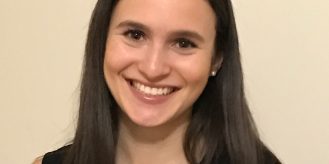
The symposium was held in memory of Larry Lewin, long-time member of the Smokler Center’s International Health Advisory Committee (HAC) and a pioneer in the health care policy field in the United States for many decades.
The symposium theme was “Connected Health” and the evolving use of technology and data to improve health and medical outcomes—a topic of much relevance given Israel’s place as a global leader in the digitalization of medical and health data and the development of health information systems.
The keynote speaker was HAC member Dr. Jonathan Javitt, a friend of Larry Lewin, and an MD with a long career in the field of information technology, health economics, and public health. Javitt used his talk to explore the role of technology within changing models of care for chronic illness. Since the 1980s, there has been a trend towards harnessing medical and health care data to improve health care, first by analyzing medical claims data and then through electronic patient records and most recently through wearable sensors.

Such information could be indispensable to helping patients manage their chronic illnesses, Javitt explained. “Patients need to know what to do next, not be turned into doctors.” At the same time, technologies would give physi cians the information and analyses that “lets them do what they do best, which is integrative thinking.”
Ultimately, Javitt concluded, harnessing of innovative technology and analytical techniques to improve health of vulnerable populations is “not about big data, it’s about big imagination. And this is what Larry Lewin was all about.”
Dr. Boaz Lev, Associate Director General of the Ministry of Health and the head of the Ministry’s health division, discussed highlights from the Ministry’s Digital Health initiative. The goal, Dr. Lev explained, is to lead the Israeli health system through the technological transformation of healthcare services into an era of empowered, personalized quality medicine and health. He spoke about the Ministry’s role as a regulator and the challenge it faces in finding a solution to privacy concerns that are at the heart of the legal system’s reservations.
Dr. Rachelle Kaye, Coordinator of Maccabi Health Fund’s International Center for R&D, emphasized that with e-health here to stay, the challenge will be to use the data intelligently and effectively. Technological advancement notwithstanding, she added, there is still “no substitute for the human interaction. There is still the added value of the health care professional.”
Dr. Ilan Zehlinger, Director of Medical Planning and Development at the Hospital Division of Clalit Health Services, spoke of the need for “system interoperability,” with clearly defined data standards and legal and regulatory frameworks that allow for greater integration across organizations and across different data platforms.
Finally, the Technion’s Dr. Uri Rosenschein, who is also Director of Cardiology at B’nai Zion Medical Center in Haifa, reflected on the opportunities presented by blending two of Israel’s most advanced industries—the information technology sector and medical technology sector. The result will be a “brave, new, positive world for all of us.”
Journalist Saul Singer, co-author of Start-up Nation, framed the technological advances in historical terms. “When we look back at our era in 100 years,” he said, “we will say, ‘I can’t believe they lived like that, with no idea what was going on inside the body, and only when we felt something wrong did we go to the doctor.'”
Singer admitted that concerns about privacy were justified, but said that the benefits of using technology are there and we have to overcome the legal and bureaucratic challenges to using them. By pulling the data together within a framework that protects privacy, medical care could be raised to a new level.

The Symposium’s final presentation brought the focus back to Larry Lewin, with the personal reminisces of Prof. Stuart Altman, Professor of Health Policy at Brandeis University’s Heller School for Social Policy, longstanding member of the Smokler Center’s Health Advisory Committee, and close friend of Larry.
Altman described Lewin as “bigger than life—one of the top 3 best-known people in the United States in health care policy and management.” Drawing on the previous speakers’ discussions of technology, Altman declared that “if we could only have taken the equivalent of Larry Lewin and made a technology out of it, our health care problems would have been solved a long time ago.”


